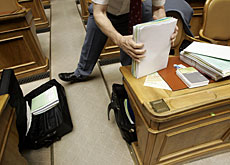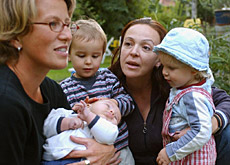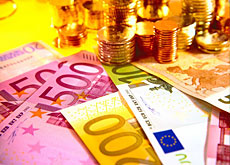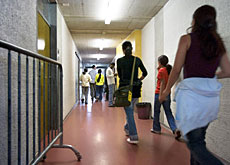Turning the screw on spending and foreigners

Closer ties with the European Union, a reduction in the budget deficit and family-friendly measures are some of the main achievements of this parliament.
But the balance sheet for the past legislative term is less impressive when it comes to shoring up the social security system and easing regulations for asylum seekers, according to a swissinfo survey among parliamentarians.
The rightwing Swiss People’s Party emerged as one of the main winners of the 2003 elections to the House of Representatives, mainly at the expense of the centre-right.
Over the past four years parliament succeeded in cutting financial deficits. The latest federal accounts and the budget are both in the black as a result of the favourable economic conditions and steps taken to boost the economy.
“It is a clear victory for the right in general,” said Léonard Bender of the centre-right Radical Party, adding it was important to keep a close eye on the finances.
However, the centre-left criticises the cost-cutting measures as “extremely severe” and points out that the 26 cantons have had to bear the brunt and step in to take over tasks from the federal authorities.
“This can’t be the solution for the future,” said senator Alain Berset from the centre-left Social Democratic Party, adding that additional cuts in federal expenditure were “useless and counterproductive”.
EU bilaterals
Parliament continued to support a policy of bilateral agreements with the EU over the past four years, allowing Switzerland to join the EU’s common border and asylum policy – known as the Schengen/Dublin treaty – in the near future.
Parliament also adopted a SFr1 billion ($820 million) payment to the ten new EU member states who joined in May 2004 and extended access to the Swiss labour market for citizens of these countries.
Swiss voters confirmed these decisions in nationwide ballots despite opposition by the People’s Party. But parliamentarian Yvan Perrin denies his party was wrong to campaign against the treaties, warning that the payment has set a dangerous precedent.
“The future will prove we were right after all,” he said.
The three main centre-right and rightwing parties argue confirmation of the bilateral approach is tantamount to shelving full EU membership.
The left, including the Green Party, are still in favour of Switzerland joining the 27-nation bloc.
“It doesn’t make sense for Switzerland to take over more and more elements of EU legislation without being able to take part in the discussions,” said Green parliamentarian Ueli Leuenberger.

More
EU bilateral accords
Families and foreigners
The 2003-2007 term also saw parliament approving a proposal for 14-week paid maternity leave at a federal level. It took 60 years for the principle, anchored in the constitution, to take effect.
Other measures aimed at a more family-friendly policy include a SFr120 million package to support the creation of crèches, minimum standards for family benefits as well as tax breaks for married couples.
“We are pleased to say that we were able to keep our promises,” said parliamentarian Dominique de Buman, whose centre-right Christian Democratic Party traditionally puts family issues high on its agenda.
Parliament hasn’t been so generous with foreigners in Switzerland. It tightened regulations on asylum seekers and people originating from countries outside the EU and the European Free Trade Agreement space.
Politicians to the right argued the tougher laws were necessary to correct certain shortcomings, while the left described the measures as a shift towards xenophobia.
The People’s Party also forced a nationwide vote challenging successfully a parliamentary decision to ease the citizenship procedure for young second and third generation people born in Switzerland.

More
House of Representatives
Social security
Only limited progress was made by parliament during the past legislature to support the ailing pension scheme. Voters threw out a parliamentary decision to raise the retirement age for women by one year to 65 to put it on a par with that of men.
The electorate also refused to back a proposal for a slight increase of value-added tax (VAT) to help finance the pensions.
Plans to save the state disability insurance scheme from financial ruin are still under discussion. There is disagreement among the main parties over extra funding through a hike in VAT. However, parliament’s plan to cut disability benefits won approval in a nationwide ballot.
The rise in health insurance premiums – albeit less drastic in the past two years – remains a concern for many citizens, while parliament is still trying to find ways to keep health cost in check.

More
Senate
Environment
Parliament has a mixed record when it comes to environmental issues and measures to counter the threat of global warming.
The Greens, who champion environmental matters, accuse parliament of failing to take the necessary steps to encourage energy-saving methods.
However, other parliamentarians stress that parliament passed a law aimed at reducing carbon dioxide emissions.
swissinfo, based on a French article by Olivier Pauchard
The four main parties are: the rightwing Swiss People’s Party, the centre-left Social Democratic Party, the centre-right Radical Party and the centre-right Christian Democratic Party.
Together they won 216 of the 246 seats in elections for the House of Representatives and the Senate in 2003.
The Greens are the biggest non-governmental group with 13 seats.
Latest opinion polls ahead of the 2007 elections see the Greens winning nearly 11% of the vote, up 3.5% on 2003.
The People’s Party emerged as one of the main winners of the 2003 parliamentary elections. Subsequently they also claimed a second seat in cabinet at the expense of the Christian Democrats.

In compliance with the JTI standards
More: SWI swissinfo.ch certified by the Journalism Trust Initiative




You can find an overview of ongoing debates with our journalists here. Please join us!
If you want to start a conversation about a topic raised in this article or want to report factual errors, email us at english@swissinfo.ch.